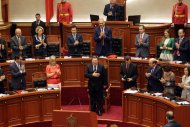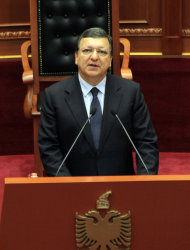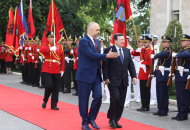Serbian president meets with Barroso
Source: Beta, Tanjug
BELGRADE -- Tomislav Nikolić and Jose Manuel Barroso
have concluded that Serbia and the EU hold different views on world
events "in some 50 percent of the cases."
The
Serbian president told a joint news conference he held in Belgrade with
the president of the European Commission that he "explained the
position of Serbia on any specific point of disagreement, even where we
have an agreement on common policy."
"We will consider if we
perhaps missed to have identical positions somewhere... Serbia is a
country that has its own policy and we wish to fit this policy into the
interests of all citizens of Serbia and in a much broader policy," said
Nikolić.
Nikolić said that he discussed chapters 23 and 24,
regarding the fight against corruption and crime, and public
administration reform and added that they also discussed relations with
the administration of Priština, what has been achieved so far and what
is yet to be achieved, and the conditions of implementation of the
Brussels agreement.
According to him, the meeting was open, and
that during it, "positions that are the same, as well as those that
could be the subject of discussion in order to find a common path" were
noted.
Serbia, Nikolić said, has its own policy that should be
conducted in accordance with the interests of the citizens, it has
"friends in the north and the east and the west and the south," but
added that it was "necessary to fit this policy into a broader policy."
Barroso said he believes that, "if there is political will on both sides," Serbia can join the EU.
Nikolić thanked him for the efforts and support given by Serbia on its
path towards the EU and said that Barroso came to visit Serbia, "the
next member of the EU."
Nikolić believes that Serbia "made
progress also because all members of the European Commission, above all
Barroso, were committed to the idea that Serbia in the near future
should join the EU."
He added that the assistance that the
European Union gave after the catastrophic floods showed that Serbia
"can count on a much larger European family."
"Who knows how
this would have ended up if many EU member states, but also those that
are not, did not help with the equipment that Serbia does not have," he
said.
Nikolić said he and Barroso discussed a donor conference
that will "show solidarity with Bosnia-Herzegovina and Serbia of all
countries of the world, with the full patronage of the EU and with the
cooperation of the United Nations."
Talking about political
issues, Nikolić said that without Serbia in the EU, "the future of the
Western Balkans would be very uncertain."
Barroso
said that the process of Serbia's accession to the EU was going at a
good pace thanks to the commitment of the negotiating team and said that
Serbia can count on the support of the EU in the further process.
Speaking about reform programs, the president of the European
Commission welcomed the economic reform, the fight against crime and
corruption, and public administration reform.
"I believe that
it is important for the Serbian people, regardless of accession to the
EU," he said. Barroso said that the EU was with Serbia "in times of pain
and suffering," and expressed condolences to the victims of the recent
floods.
"There is still a lot of work, but you can count on the
support of the EU," he said, recalling that on a donor conference
organized by France and Slovenia, and hosted by the EU, would be held in
Brussels on July 16.
Barroso emphasized "the significant
progress in the normalization of relations with Kosovo," which he said
was certainly very important.
"I expect that Belgrade and Priština ensure the continuation and progress of the dialogue," he said.
According to him, Serbia has "a unique role" in the Western Balkans and
its accession to the EU is crucial for further enlargement of the EU in
the region.
"I'm here on behalf of the EU to reiterate that
this process can succeed," concluded the outgoing president of the
European Commission at the end of his visit to Serbia.





